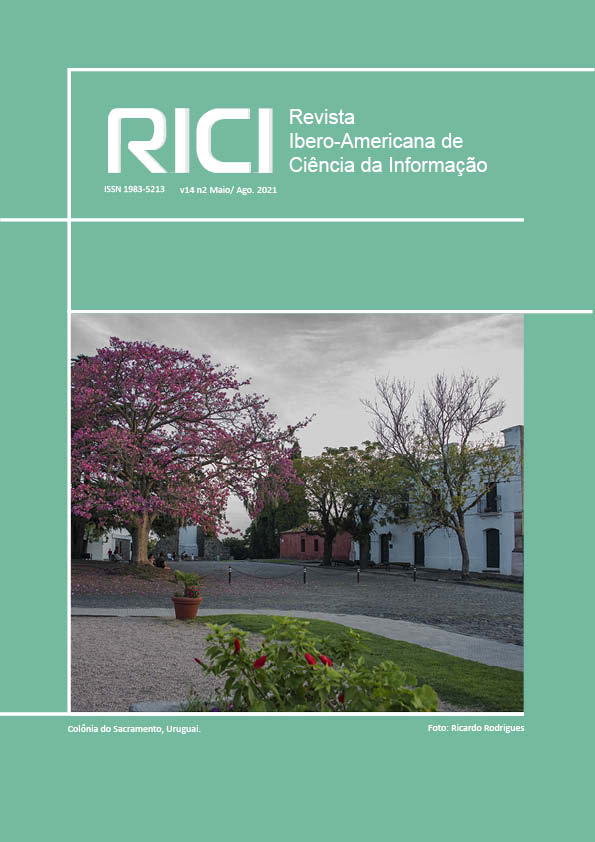The 2030 Agenda and information science: the contribution of libraries and information centers
DOI:
https://doi.org/10.26512/rici.v14.n2.2021.37380Keywords:
2030 Agenda, Bibliometrics, Information Science, Libraries, Sustainable development GoalsAbstract
The United Nations held a summit meeting in 2015 where it was approved the 2030 Agenda. This Agenda is ambitious and aims to achieve the Sustainable Development Goals across the universe. The 17 SDGs target all sectors of society, including libraries, archives, and documentation centers. These institutions allow access to information and support information literacy, digital and other actions, help local governments to understand the information needs necessary by communities. This work aims to present the role of libraries and information centers in supporting and implementing Agenda 2030 and the SDG. To this end, a bibliometric and quantitative analysis of scientific production on the 2030 Agenda and the SDGs and libraries and archives indexed on the Web of Science and Scopus was carried out in the period from 2015 to 2019. From the analysis performed, we recovered a total of 40 articles, highlighting the role of libraries and documentation centers in general, and public libraries and higher education libraries. In most articles, the role of these institutions in the implementation of the SDGs is well known, and in individual terms, SDG 4 - Ensuring inclusive education, the one that stands out. The role of the IFLA is highlighted, as the main international entity that represents the interests of the information services and its users and that has worked to promote the library area as a generating force of an informed society.
Downloads
References
ALVIM, L. Análise bibliométrica de publicações sobre o tema Agenda 2030 na área da Ciência da Informação indexadas na Web of Science. In: ENCUENTRO IBÉRICO EDICIC 2019, 9. Org. Facultat de Biblioteconomia i Documentació de la Universitat de Barcelona, 2019. Obtido de http://hdl.handle.net/10760/34420
BRADLEY, Fiona. A world with universal literacy: The role of libraries and access to information in the UN 2030 Agenda. IFLA journal, v. 42, n. 2. p. 118-125, 2016. Obtido de https://journals.sagepub.com/doi/full/10.1177/0340035216647393
FERNÁNDEZ-HERNÁNDEZ, S.; LOBELLE-FERNÁNDEZ, G.; RIVERA, Z. Las bibliotecas públicas por el desarrollo sostenible. Revista Cubana de Información en Ciencias de la Salud (ACIMED), v. 29, n. 2, p. 1-16, 2018. Obtido de http://scielo.sld.cu/pdf/ics/v29n2/a02_1247.pdf
GARRIDO, M.; WYBER, S. Development and Access to Information (DA2I). The Hague, 2017. Obtido de https://da2i.ifla.org/sites/da2i.ifla.org/files/uploads/docs/da2i-2017-full-report.pdf
GARRIDO, M.; WYBER, S. Development and Access to Information. 2019. Obtido de https://da2i.ifla.org/wp-content/uploads/da2i-2019-full-report.pdf
IFLA. The Lyon Declaration: on access to information and development. 2014. Obtido de http://www.lyondeclaration.org/
IFLA. Access and opportunity for all: How libraries contribute to the United Nations 2030 Agenda. The Hague: IFLA, 2017a. Obtido de https://www.ifla.org/files/assets/hq/topics/libraries-development/documents/access-and-opportunity-for-all.pdf
IFLA. IFLA Toolkit: Libraries, Development and the United Nations 2030 Agenda. The Hague, 2017b. Obtido de https://www.ifla.org/files/assets/hq/topics/libraries-development/documents/libraries-un-2030-agenda-toolkit-2017.pdf
IFLA. International Advocacy Programme (IAP) Update – October 2017. 2017c. Obtido de https://www.ifla.org/files/assets/hq/topics/libraries-development/documents/iap-update-october2017.pdf
IFLA. Libraries and the Sustainable Development Goals: a storytelling manual. Den Haag: IFLA, 2018. Obtido de https://www.ifla.org/files/assets/hq/topics/libraries-development/documents/sdg-storytelling-manual.pdf
NAKAMURA, M.; PENDLEBURY, D.; SCHNELL, J.; SZOMSZOR, M. Navigating the Structure of Research on Sustainable Development Goals. Institute for Scientific Information. 2019. Obtido de https://clarivate.com/g/sustainable-development-goals/
OCHÔA, P.; PINTO, L. G. Agenda 2030 e o campo de intervenção da Ciência de Informação: dinâmicas de aprendizagem, envolvimento e desenvolvimento de competências. Cadernos BAD, v. 2, p. 1-11, 2019. Obtido de https://www.bad.pt/publicacoes/index.php/cadernos/article/view/2043/pdf
ORGANIZAÇÃO DAS NAÇÕES UNIDAS. Transforming our world: the 2030 Agenda for Sustainable Development. New York: UN. 2015. Obtido de https://sustainabledevelopment.un.org/content/documents/21252030%20Agenda%20for%20Sustainable%20Development%20web.pdf
ORGANIZAÇÃO DAS NAÇÕES UNIDAS. The Sustainable Development Goals report. New York, 2016. Obtido de http://ggim.un.org/documents/The Sustainable Development Goals Report 2016.pdf
ORGANIZAÇÃO DAS NAÇÕES UNIDAS. The Sustainable Development Goals report. New York, 2017. Obtido de https://unstats.un.org/sdgs/files/report/2017/thesustainabledevelopmentgoalsreport2017.pdf
ORGANIZAÇÃO DAS NAÇÕES UNIDAS. The Sustainable Development Goals report. New York, 2018. Obtido de https://unstats.un.org/sdgs/files/report/2018/TheSustainableDevelopmentGoalsReport2018-EN.pdf
ORGANIZAÇÃO DAS NAÇÕES UNIDAS. The Sustainable Development Goals report. New York, 2019. Obtido de https://unstats.un.org/sdgs/report/2019/The-Sustainable-Development-Goals-Report-2019.pdf
Downloads
Published
How to Cite
Issue
Section
License
Copyright (c) 2021 Teresa Costa, Luísa Alvim

This work is licensed under a Creative Commons Attribution 4.0 International License.
Copyright Notice
Authors who publish in this journal agree to the following terms:
- Authors retain copyright and grant the journal right of first publication with the work simultaneously licensed under the Creative Commons Attribution License 4.0, allowing the sharing of work and recognition of the work of authorship and initial publication in this journal.
- Authors are able to take on additional contracts separately, non-exclusive distribution of the version of the paper published in this journal (ex.: distribute to an institutional repository or publish as a book), with an acknowledgment of its initial publication in this journal.
- Authors are permitted and encouraged to distribute their work online (eg.: in institutional repositories or on their website) at any point before or during the editorial process, as it can lead to productive exchanges, as well as increase the impact and citation the published work.
















